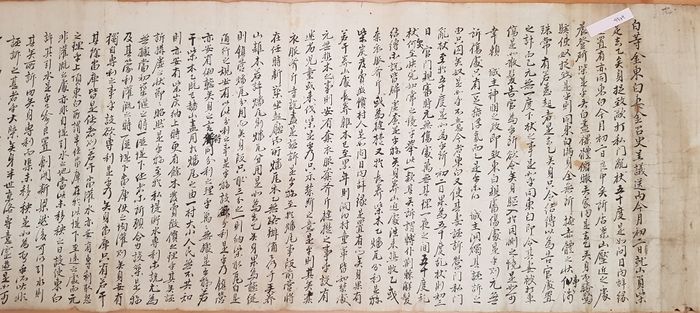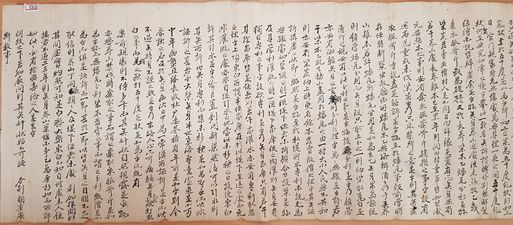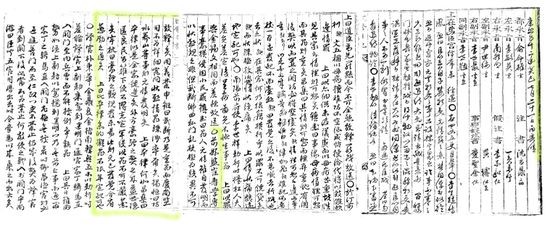(Translation) 1713年 崔壽學 原情 1
| Primary Source | ||
|---|---|---|
 |
Title | |
| English | ||
| Chinese | 1713年 崔壽學 原情 | |
| Korean(RR) | 1713년 최수학 원정(ChoeSuhak Wonjeong) | |
| Text Details | ||
| Genre | Social Life and Litigation System | |
| Type | Civil Affair Document | |
| Author(s) | 崔壽學 | |
| Year | 1713 | |
| Source | 承政院日記 The Daily Records of Royal Secretariat of Joseon Dynasty | |
| Key Concepts | ||
| Translation Info | ||
| Translator(s) | Participants of 2019 JSG Summer Hanmun Workshop (Advanced Translation Group) | |
| Editor(s) | ||
| Year | 2019 | |
목차
- 1 Introduction
- 2 Original Script
- 3 Discussion Questions
- 4 Further Readings
- 5 References
- 6 Translation
- 6.1 (sample) : Jaeyoon Song
- 6.2 Student 1 : Yishu Ma
- 6.3 Student 2 : Samuel Chan 陳世熙 진세희
- 6.4 Student 3 : Younès M'Ghari
- 6.5 Student 4 : King Kwong Wong
- 6.6 Student 5 : 신동조
- 6.7 Student 6 : Stacey Lui
- 6.8 Student 7 : (Write your name)
- 6.9 Student 8 : Q
- 6.10 Student 9 : (Write your name)
- 6.11 Student 10 : (Write your name)
- 6.12 Student 11 : (Write your name)
- 6.13 Student 12 : (Write your name)
- 6.14 Student 13 : (Write your name)
- 6.15 Student 14 : (Write your name)
Introduction
金東白과의 相訟 건. 武人출신 양반 崔壽學과 平民 출신 金東白 간에 최씨 가문이 養山한 곳에서의 땔나무 斫伐, 사적 형벌(私門亂杖), 저수지에서의 물이용 등을 다툰 소송사건.
- 작성시기: 1713년(숙종39)경의 草本 혹은 후대 전사본.
- - 『承政院日記』 479책 (탈초본 25책) 숙종 39년 7월 21일 병인 25/62 기사.
- - 1713년 康熙(淸/聖祖) 52년. 金鎭圭 등이 입시하여 崔壽學의 죄목과 처리에 대해 논의함.
- 작 성 자: 崔壽學(1652~1714)
- 수 취 자: 大邱都護府
- 주 제 어: 就山負柴, 捉致毆打, 白晝裸體俯瞰, 散髮告官, 一足指浮氣, 私門 亂杖五十度, 樵牧 奪衣服斧斤橽檚, 長養柴木燔瓦分利, 柴炭發賣 徵價村人, 鎭營燔瓦分用 取三分之一 納柴取瓦, 私堤貯水專利,
Original Script
| Classical Chinese | English |
|---|---|
|
01 白等 金東白妻金召史呈議送內 今月初二日 就山負柴 02 是去乙 矣身捉致毆打 私門亂杖五十度是如 問目內辭緣 03 是置有亦 同東白 今月初二日良中 矣所居案山壓近之處 04 晨登斫柴是乎矣 白晝裸體俯瞰矣家內是去乙 矣身不勝驚 05 駭 使奴捉致是乎則 同東白滿身全無所掩 赤體之狀 事涉 06 殊常 有若惹起者是去乙 矣身只令結縛 以爲告官處置 07 之計而已 元無一度下杖之事是如乎 同東白卽令其妻 被打重 08 傷是如 散髮告官爲乎所 欲令矣身驅入於罔惻之境是如可 09 幸賴城主神明之政 卽致東白親審傷處是乎則 元無 10 所傷處 只有一足指浮氣而已是乎等以 |
I hereby report to you. Lady Gim, the wife of Gim Dongbak, accused me in the appeal she filed to the governor that I arbitrarily caught Gim Dongbak and beat him up, that I caned him fifty times in disorderly manner within my private realm. According to the contents in the clauses of inquisition, Gim Dongbak chopped off trees in the early morning of the second day of this month in the mountains right in front of where I live, and in complete nakedness in the light of day, he was looking over at my house. In an unbearable astonishment, I had my slaves go catch him. As this Dongbak was completely naked with nothing to cover his body with, an extremely eerie situation unfolded. I just ordered my slaves to tie him up with a view to taking him to the police. I originally had no plan whatsoever to beat him up. This Donbak had his wife report to the government with her braids untied and disheveled that Dongbak was severely wounded. They wanted to push me into a woeful trap. Fortunately, thanks to the sagacious judgment of the magistrate, a government official investigated whether or not Dongbak was wounded and ruled that he was completely unscarred except for one swollen toe. |
|
11 由 只囚矣奴是如乎 不意今者 東白又使其妻誣訴營門 私門 12 亂杖 至於五十度是如爲乎所 初二日果爲五十度亂杖 則初三 13 日營門親審時 元無傷處 萬無其理 一夜之間五十度亂 14 杖處 何至快完如常之境乎 擧此一款 其矣所謂轉仆荊棘 解髮 15 結縛等說 皆歸虛套是乎旀 矣身養山近處 往來樵牧乙 或 16 奪衣服斧斤 或爲橽檚 又於長養柴木乙 燔瓦分利是旀 17 柴炭發賣 徵價村人是如 問目內辭緣是置有亦
|
This is the reason why the magistrate who clearly investigated this issue decided that it was a slander, and only imprisoned my slave. Unexpectedly, Dongbak has recently had his wife report to the government office once again, insisting that I arbitrarily flogged him fifty times. On the second day of this month, if he was indeed flogged, how could it be that on the third day of this month when the officials investigated into this matter, he was found completely unscarred. This is totally unreasonable! How could the wounds from fifty times of flogging could heal overnight so completely like normal? Just by looking at this one thing, the accusations that I made him roll on thorns and tied him up with his hair disheveled are all groundless. As is written in the list of questions, they accused me of having taken away clothes and axes from young woodcutters in the area close to where I nurtured trees ,beat and flogged them; they also accused me of having profiteered by using trees for burning roof tiles, and sold charcoals to collect money from villagers. |
|
矣身果有 18 若干養山處 長養雜木 已至累年 則洞內村童輩 皆知禁處 19 元無樵木之事 則安有奪衣服奪斧斤撻檚之事乎 設有 20 迷劣兒童 或來伐柴是乎乃 只示禁斷之意是乎則 其矣奪 21 衣服斧斤等說 盡是誣訴是乎旀 至於燔瓦事段 前營將 22 在任時 新築坐起廳 而所燔瓦木乙 無路辦備乙仍于 矣養 23 山雜木若許燔瓦 則燔瓦分用是如爲去乙 矣身果爲聽從 24 則鎭營燔瓦分用 而矣身段 只取三分之一 則納柴取瓦 自是 25 通行之規 安有以此分利之事是乎旀 設欲分利是乎乃 鎭營 26 亦安有偏廳矣身之言 符同分利之理乎 萬萬無據是乎旀 若 27 干柴木乙 旣已赭山盡用於燔瓦之由 一村大小人民 無不共知 28 則亦安有柴炭納上時 更有餘木發賣 徵價之理乎 其矣誣 29 訴構虛之狀 節節昭然是乎旀 至於私堤貯水專利等說 尤爲 30 無據 當初築堰之時 一從堤下作者等所願 合力設築是旀 31 及其蒙利灌漑之時 一從堤下畓庫 使之均灌則 矣身安有 32 獨自專利之事乎 設欲專利是乎乃 矣身畓庫只有若干 33 其餘畓庫 皆是作者 則若干畓灌水 亦安有專利取怨 34 之理乎 |
I indeed have a few places in the mountains where I have nurtured shrubs and wild trees for several years. All tree-cutting boys are well aware that they ought not to enter into those areas. I have never had a problem with tree-cutters. Why would I take clothes and axes and punish anybody at whim? If by any chance a misguided boy comes and collects firewood, I only have to tell him why it is prohibited. The accusations that I have extorted clothes and axes all sheer lies and slanders. As to the issue of burning roof tiles, [I should let you know that] the former general, while incumbent, constructed a new building for routine activities, and had no means to obtain firewood for roasting of roof tiles. I used a little amount of firewood from the forest I have built, for which the former general wished to share the burned roof tiles with tiles with me. I indeed listened to his request, and the military garrisoned shared them with me. I took one third of the roof tiles. This is to take roof tiles in return for submitting firewood. It was a regulation that was commonly practiced. How could it be considered the case of sharing profit [with the government]? Even if I desired to share profit, how would the military garrison only listen to my words and agree to share profit with me? It is absolutely groundless! All villagers, old and young, are aware that I have already cut down all trees and used them up for burning roof tiles. How could I sell the remnants of firewood to the people and collect money from them? That their accusations are all groundless and deceptive is so very bright. As to their accusation that I made a reservoir and monopolized water resources is all the more groundless. Initially when I constructed the reservoir, those who lived below wished to have it and participated voluntarily in the construction. When they received the benefits of irrigation, I saw to it that their wet lands were equitably irrigated. How could I monopolize the profit all by myself? Other than that, I only have a small acres of wet land which I irrigated. How could it be reason to say that I received grievances by monopolizing water resources?
|
|
上項東白所謂半作畓庫 在於此堤下至遠之處 而元 35 非灌漑之處 亦非自堤引水之地 當此未移秧之日 設使東白 36 許其引水是乎乙喩良置 創開新梁然後 可以引水 則 37 其矣所訴內 矣身專利 而渠未移秧是如爲臥乎所 此非 38 誣訴之甚者乎 |
The wet land half-cultivated by Dongbaek is located in a place remotely detached from this reservoir, and he originally has no land for irritation. Neither is it a piece of wet land where he could draw water from the reservoir. Before the date of planting rice seedlings, if he wishes to irrigate his land, he should first construct a reservoir before he could draw water. When he accused me of having monopolized water, yet he says that he has not yet planted rice seedlings; is this not a severe slander? |
|
大槩矣身半世京洛 專意宦遊是如可 39 中年病蟄 且緣喪敗杜戶委巷 積有年所是如乎 到今 40 豪强之名及於矣身病伏之中 爲一常漢所誣訴是乎所 此 41 不過矣持身不謹之致是乎乃 末路人心 亦可痛駭 矣身元無毆打東 42 白之事 而謂之毆打五十度足杖是如爲乎所 旣有 43 案前親審 則不待多卞 而其矣奸狀 自然現露是乎旀 44 亦無養山禁伐時 奪取之事 而謂之奪取衣服斧斤是如 45 爲乎旀 亦無燔瓦分利柴木發賣之事 而謂之分利徵價是如 46 爲乎所 俱是誣訴 而一節甚於一節 此皆矣身之自明 不足 47 取信 則養山下洞長頭頭人 及堤下作者等處 別加推問 則 48 其間虛實 灼然可知是白齊 大槩東白 不知自何處來人 住 49 接者不過二三年 則矣身養山築堰等事乙 萬無所知 而所訴 50 如此 此必有指嗾書給之人是去乎 51 明政之下 若加嚴問 則其矣奸狀 昭不可掩 各別明査 處 52 斷敎事 |
I have spent half of my entire life as a devoted official in the capital; however, in my middle years, I grew sick and went into hiding. Moreover, because of losses and disasters, I had stayed home in the village for many years. Now I have been framed by the name of powerful bully. I have been slandered by a base commoner. This is indeed because I have not been sufficiently careful; however, the extreme case of people’s emotions is also surprising. I have not beaten Dongbaek up, but he accuses me of having flogging him fifty times on his soles. As there already is the former report of official investigation, the falsity of his appeal would be clear. Although there is no incident of extortion during the times when I have nurtured and banned chopping trees, he accuses me of having confiscated clothes and took away axes. Although I have not shared profit in the course of roasting roof tiles, he accused me of having shared profit and sold charcoals to villagers. Everything he has is a false accusation. each accusation is more severe than before. it is clear to me that [his accusations] are unreliable. If you inquire into those who live below the mountains where I have nurtured trees and those who participated in the construction of the reservoir, truths would be revealed clearly. In general, Bongbaek is from an unknown place, and lived here no more than two to three years. He could not for the life of him know anything about how I nurtured trees and constructed reservoirs. Nevertheless he files a lawsuit like this; this must be someone who has instigated him and written on his behalf. In your clear judgment, if you investigate this issue rigorously, then his twisted accusations would be clearly shown. Please take extra care for transparent scrutiny, and punish him in accordance with law.
|
Discussion Questions
- What can we learn from this document about the due processes of lawsuit?
- Why do you think Kim Dongbak went naked in front of Choe's family?
- What does this document tell us about the conditions of commoners in late 18th century Joseon?
- What does this document tell us about the social environment of 18th century Joseon, especially in relation to the conflict between elites and commoners?
- How would you account for Kim and his wife's behaviors described in this document?
- One of the issues arose in the lawsuit pertains to the dispute over the public and private use of resources. Behind this dispute lies a pre-modern conception of what was public and private. So, to a pre-modern person, what was public and private? By extension of this question, how did a pre-modern person relate the concept of public and private to that of social justice? William Rowe wrote about a civil society in 19th century Hankow, whose conception was partly attributed to how people thought was public in their community. Can we see similar phenomena in this case?
Further Readings
References
Translation
(sample) : Jaeyoon Song
I hereby report to you. Lady Gim, the wife of Gim Dongbak, accused me in the appeal she filed to the governor that I arbitrarily caught Gim Dongbak and beat him up, that I caned him fifty times in disorderly manner within my private realm. According to the contents in the clauses of inquisition, Gim Dongbak chopped off trees in the early morning of the second day of this month in the mountains right in front of where I live, and in complete nakedness in the light of day, he was looking over at my house. In an unbearable astonishment, I had my slaves go catch him. As this Dongbak was completely naked with nothing to cover his body with, an extremely eerie situation unfolded. I just ordered my slaves to tie him up with a view to taking him to the police. I originally had no plan whatsoever to beat him up. This Donbak had his wife report to the government with her braids untied and disheveled that Dongbak was severely wounded. They wanted to push me into a woeful trap. Fortunately, thanks to the sagacious judgment of the magistrate, a government official investigated whether or not Dongbak was wounded and ruled that he was completely unscarred except for one swollen toe.
This is the reason why the magistrate who clearly investigated this issue decided that it was a slander, and only imprisoned my slave.
Unexpectedly, Dongbak has recently had his wife report to the government office once again, insisting that I arbitrarily flogged him fifty times. On the second day of this month, if he was indeed flogged, how could it be that on the third day of this month when the officials investigated into this matter, he was found completely unscarred. This is totally unreasonable! How could the wounds from fifty times of flogging could heal overnight so completely like normal? Just by looking at this one thing, the accusations that I made him roll on thorns and tied him up with his hair disheveled are all groundless. As is written in the list of questions, they accused me of having taken away clothes and axes from young woodcutters in the area close to where I nurtured trees ,beat and flogged them; they also accused me of having profiteered by using trees for burning roof tiles, and sold charcoals to collect money from villagers.
矣身果有
若干養山處 長養雜木 已至累年 則洞內村童輩 皆知禁處 元無樵木之事 則安有奪衣服奪斧斤撻檚之事乎 設有 迷劣兒童 或來伐柴是乎乃 只示禁斷之意是乎則 其矣奪
21 衣服斧斤等說 盡是誣訴是乎旀 至於燔瓦事段 前營將
22 在任時 新築坐起廳 而所燔瓦木乙 無路辦備乙仍于 矣養
23 山雜木若許燔瓦 則燔瓦分用是如爲去乙 矣身果爲聽從
24 則鎭營燔瓦分用 而矣身段 只取三分之一 則納柴取瓦 自是
25 通行之規 安有以此分利之事是乎旀 設欲分利是乎乃 鎭營
26 亦安有偏廳矣身之言 符同分利之理乎 萬萬無據是乎旀 若
27 干柴木乙 旣已赭山盡用於燔瓦之由 一村大小人民 無不共知
28 則亦安有柴炭納上時 更有餘木發賣 徵價之理乎 其矣誣
29 訴構虛之狀 節節昭然是乎旀 至於私堤貯水專利等說 尤爲
30 無據 當初築堰之時 一從堤下作者等所願 合力設築是旀
31 及其蒙利灌漑之時 一從堤下畓庫 使之均灌則 矣身安有
32 獨自專利之事乎 設欲專利是乎乃 矣身畓庫只有若干
33 其餘畓庫 皆是作者 則若干畓灌水 亦安有專利取怨
34 之理乎 上項東白所謂半作畓庫 在於此堤下至遠之處 而元
35 非灌漑之處 亦非自堤引水之地 當此未移秧之日 設使東白
36 許其引水是乎乙喩良置 創開新梁然後 可以引水 則
37 其矣所訴內 矣身專利 而渠未移秧是如爲臥乎所 此非
38 誣訴之甚者乎 大槩矣身半世京洛 專意宦遊是如可
39 中年病蟄 且緣喪敗杜戶委巷 積有年所是如乎 到今
40 豪强之名及於矣身病伏之中 爲一常漢所誣訴是乎所 此
41 不過矣持身不謹之致是乎乃 末路人心 亦可痛駭 矣身元無毆打東
42 白之事 而謂之毆打五十度足杖是如爲乎所 旣有
43 案前親審 則不待多卞 而其矣奸狀 自然現露是乎旀
44 亦無養山禁伐時 奪取之事 而謂之奪取衣服斧斤是如
45 爲乎旀 亦無燔瓦分利柴木發賣之事 而謂之分利徵價是如
46 爲乎所 俱是誣訴 而一節甚於一節 此皆矣身之自明 不足
47 取信 則養山下洞長頭頭人 及堤下作者等處 別加推問 則
48 其間虛實 灼然可知是白齊 大槩東白 不知自何處來人 住
49 接者不過二三年 則矣身養山築堰等事乙 萬無所知 而所訴
50 如此 此必有指嗾書給之人是去乎
51 明政之下 若加嚴問 則其矣奸狀 昭不可掩 各別明査 處
52 斷敎事
Student 1 : Yishu Ma
- Discussion Questions:
What can we learn about the social environment of the 18th century Joseon from this document, such as the relationship between the elite class and common people?
What are the deep meanings behind Kim's and his wife's behaviors described in this document?
Student 2 : Samuel Chan 陳世熙 진세희
- Discussion Questions: One of the issues arose in the lawsuit pertains to the dispute over the public and private use of resources. Behind this dispute lies a pre-modern conception of what was public and private. So, to a pre-modern person, what was public and private? By extension of this question, how did a pre-modern person relate the concept of public and private to that of social justice? William Rowe wrote about a civil society in 19th century Hankow, whose conception was partly attributed to how people thought was public in their community. Can we see similar phenomena in this case?
Student 3 : Younès M'Ghari
- Discussion Questions:
Were slaves in China and other societies also resorting to this act of indecency to express their anger?
To what extent was the class consciousness of the yangbans comparable to that of contemporary bourgeoisie?
Student 4 : King Kwong Wong
- Discussion Questions:
How does this document reflect the social status of the Yangban elites? Considering the litigation between the Yangban and commoners, did the Yangban receive special treatment? Also considering the factional struggle of the period, did it affect the outcome of the law case?
Student 5 : 신동조
- Discussion Questions:
Could the verdict have been different if the accused had been a member of 西人, the ruling party?
Student 6 : Stacey Lui
- Discussion Questions:
When did the earliest case of a yangban-commoner legal dispute occur in the Chosŏn period? Did they become more frequent over time? If so, what does this suggest about class divisions and struggles against the elite?
Student 7 : (Write your name)
- Discussion Questions:
Student 8 : Q
- Discussion Questions:
Although we understand that many aspects of this case make it stand out, was 崔's practice of exploiting and monopolizing resources common?
Student 9 : (Write your name)
- Discussion Questions:
Student 10 : (Write your name)
- Discussion Questions:
Student 11 : (Write your name)
- Discussion Questions:
Student 12 : (Write your name)
- Discussion Questions:
Student 13 : (Write your name)
- Discussion Questions:
Student 14 : (Write your name)
- Discussion Questions:

